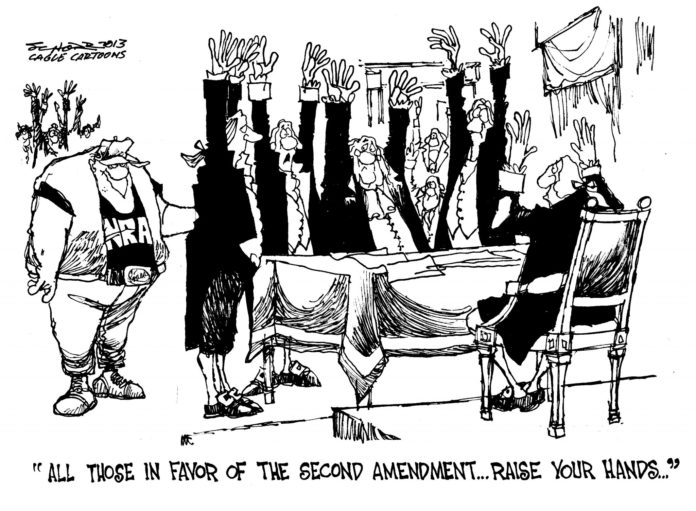BY VERN TURNER
 Recent mass killings of our citizens by other citizens who enjoy the right to keep and bear arms kicked off many debates and calls for more laws, regulations and restrictions on the weapons used in some of these incidents. Advocates of Second Amendment rights divide themselves into the camps of fear of government tyranny and a more rational position of examining the legal and necessary aspects of firearms control.
Recent mass killings of our citizens by other citizens who enjoy the right to keep and bear arms kicked off many debates and calls for more laws, regulations and restrictions on the weapons used in some of these incidents. Advocates of Second Amendment rights divide themselves into the camps of fear of government tyranny and a more rational position of examining the legal and necessary aspects of firearms control.
Note that the latter group does not advocate the confiscation of legally owned firearms. Controls like gun owner registration, magazine limits and automatic, military type weapons do not infringe on anybody’s rights to bear arms. Anything else becomes either political agenda or fear mongering.
The fact that there are nearly 300 million guns legally owned in this country speaks volumes about our national confidence and trust in one another.
History documents interpretive evolution of the Second Amendment. A recent analysis in Truthout written by Thom Hartmann suggests that this idea of bearing arms is unique to the United States in that its original intent was to preserve slavery and to prevent slave rebellions.
Since there was no standing army and the economic backbone of southern colonies [soon to become states] was slavery, pre-revolutionary “slave patrols” and militias were necessary to preserve the peace and economics of the times.
This was, of course, the root for the words that became the final version. But [Patrick] Henry, [George] Mason and others wanted southern states to preserve their slave-patrol militias independent of the federal government. So Madison changed the word “country” to the word “state,” and redrafted the Second Amendment into today’s form:
“A well regulated Militia, being necessary to the security of a free State [emphasis mine], the right of the people to keep and bear Arms, shall not be infringed.”[Hartmann]
For southern colonies to accept the Constitution and become part of the United States of America, this bow to slavery’s preservationists had to be incorporated as a compromise, from which we still suffer consequences.
Some analysts, sociologists, and ideologues think “modern” attitudes toward gun possession are rooted in this early fear of rebellious black men being armed. It is almost as if white people fear that an angry black mob will arise and slay them in retribution for prejudice. Such fears had some justification in the 1960s and ‘70s, when militant black groups formed to resist suppression by white society.
Since the end of the Civil War, the interpretation of the Second Amendment has been addressed by the Supreme and lower courts regarding who has the continuing rights to carry what kind of weapon to wherever they want including marching in ad hoc military parades with arms.
Note that our state militias [the “well-regulated militia”], now known as the National Guard, no longer search slave quarters for signs of rebellion and insurrection; the state guard units are at the command of the state governors for use in emergencies affecting the people of that state to supplement law enforcement and maintain order.
We have seen racial issues require federal troops to enforce segregation laws because racist governors [Faubus of Arkansas and Wallace of Alabama] chose not to deploy guardsmen to allow black students to attend previously all-white schools.
Even older historical legal decisions and factors define America’s existing relationships with guns. Spanish conquistadors used them to intimidate Native Americans while gaining footholds on this continent. Over the next 350 years, theirs and descendants of other Europeans used more guns of ever-higher technology, assuring conquest of the indigenous peoples and making North America an extension of Europe.
With economically driven exploitation of the New World, cheap labor became necessary, and nothing was cheaper than slavery. Immigrants from Great Britain, Holland, and France created massive slave trades in the Caribbean and the Americas by involuntary displacement of Africans. These human beings required oversight to keep them working and prevent them from rebelling against their bondage. Rebellions against their bondage occurred by the hundreds, of course, so the gun was used when the whip could not maintain control.
Westward-bound settlers before, during, and after the Civil War used the gun for gaining food and against resentful natives. The repeating gun became part of our national culture and was the single most important instrument in securing the continent for today’s society.
States such as Wyoming, Montana, and Alaska still promote a pioneer spirit. Coincidentally, they also lead the nation in gun ownership per citizen and the number of gun-related deaths per 100,000 residents. [Mother Jones]
History is a great teacher. It can trace events like pearls on a string. Demand from slave owners to maintain a militia to prevent slave rebellions morphed into ghastly social exercises having unintended consequences based on historical misconceptions.
Today almost anybody can own guns, and unhinged individuals have the capability to create mayhem with previously unparalleled technological efficiency. The lengths to which people go to address their fears in this modern world of comfort and plenty act as a mirror into their souls and their situational awareness.
Historical realities of the origin of the Second Amendment conflict with the spirit underlying legislative attempts to regulate today’s gun culture. We no longer have slaves. We now have a well-regulated militia along with social traditions and laws intended to prevent mayhem.
Why, then, do we need so much individual firepower? Those who fear the tyranny of government surely understand that it is the voting public who elects that government.
If the government is so corrupt such that it does become tyrannical and “We the People” do nothing about it, we have only ourselves to blame. Guns have nothing to do with this process.
– Vern Turner is a regular contributor to The Oklahoma Observer. He lives in Marble Falls, TX, where he writes a regular column for the River Cities Daily Tribune. He is the author of three books – A Worm in the Apple: The Inside Story of Public Schools, The Voters Guide to National Salvation and Killing the Dream: America’s Flirtation With Third World Status – all available through Amazon.com.








